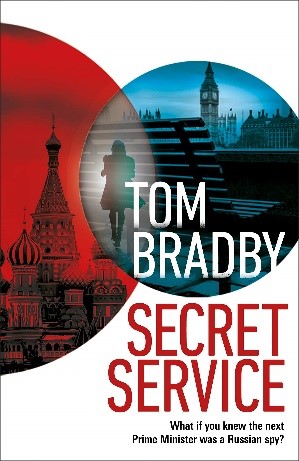(Part one of this review is here)

Tom Bradby’s Secret Service goes for a straight down the line buy-in to the standard thriller-writer depiction of Putin-era Russia in the second decade of the 21st century.
In Secret Service Bradby has his heroine put forward —in a conversation in the office of a British MP— the view that modern Russia is
… a gangster regime and the Russian president is the nemesis of everything we hold dear. In his view, a great modern Russia requires a corrupt, weak and supine West. He is the most serious and well-organized enemy of Western civilization …
He’s everywhere. He’s trying to provoke war with Georgia via the breakaway republics in an attempt to deter NATO from admitting it to membership. He’s funding and equipping right-wing paramilitary groups in Latvia, Estonia, Lithuania and even Slovakia …
the Russian president’s attempts to undermine the operation of Western democracy … has exploded into the public consciousness in America and everywhere else. But it isn’t just the false social-media accounts and the hacked emails, the leaking and assistance given to candidates of dubious views …
they’re doing much more than that. We know that they’re trying to bribe, bully or blackmail leading figures within these walls. What could be more satisfying than having Western leaders as your agents of influence?
Secret Service
Fairly straightforward stuff in terms of how Russia and its president is viewed, and portrayed, in most contemporary thrillers. Elsewhere in Secret Service we are told that the evil oligarch with the super-yacht is a close friend of Russia’s president, from their KGB days, and that the MI6 Russia Desk
estimated his total net worth at around sixty billion — roughly half the sum accumulated by the Russian president, whom they had assessed to be, by some distance, the richest man in the world.
Secret Service
The novel’s central notion of a Western political leader as an agent of influence seems, however, a little more difficult to pull off in the 21st century than in the Cold War. Rather than setting up a Western politician as a convinced but undercover ideological Communist —as was demonstrably possible back in the days of the Cambridge spies and others of that generation— in these post-Communist days such a plot device has to rely instead, as Bradby does here, on the idea that Russia can ‘bribe, bully or blackmail’ their chosen candidate.
To imagine that there could be sufficient force and subtlety to such bribing, bullying, or blackmailing that it would compel the leader of a Western country to be an ‘agent of influence’ for Russia and for that to not be discovered, takes a little more believing than the idea that a left-wing Western politician in the post-war decades could share common ideological cause with the Soviet state.
That said, fiction is fiction, and a certain amount of suspension of belief is allowable, so long as the plot falls this side of potentially feasible.
As with most such ‘hunt the mole’ Russia-related thrillers, almost none of the action takes place in Russia. But Bradby’s lead character, Kate Henderson, does have some Russia-related hinterland. She spent time in St Petersburg as a student in the early 1990s.
Though briefly covered, there are some well drawn vignettes of student life in those immediate post-Soviet years, particularly of the evening when she met her best Russian friend, Sergei, and of subsequent weeks spent with him and his family at their dacha near the Finnish border.
There are echoes in this brief section of Anna Blundy’s Neat Vodka or Sophia Creswell’s Sam Golod, both of which draw on their authors’ own experience as students in Russia around the time of the Soviet collapse.

Sergei’s dacha reappears as a location in the tense denouement to Secret Service, when Kate eventually returns to Russia.
Well, as so often, we have written far more than intended when we set out to dash off a quick review of a page-turner. Perhaps that indicates that there is more to Secret Service than at first appears.
We will be reading the second in the trilogy (Double Agent) very soon, and no doubt the third too when it is published – presumably in 2021.
[UPDATE — the third novel in the trilogy, Triple Cross, was published in May 2021. Like the others, a real page-turner].
(Part one of this review is here)